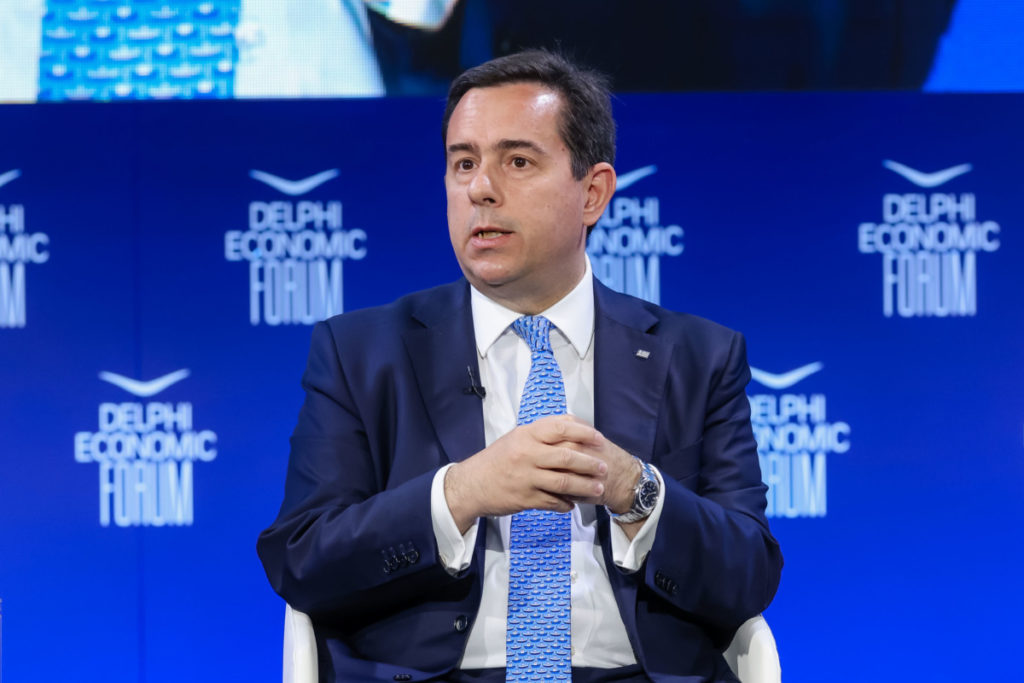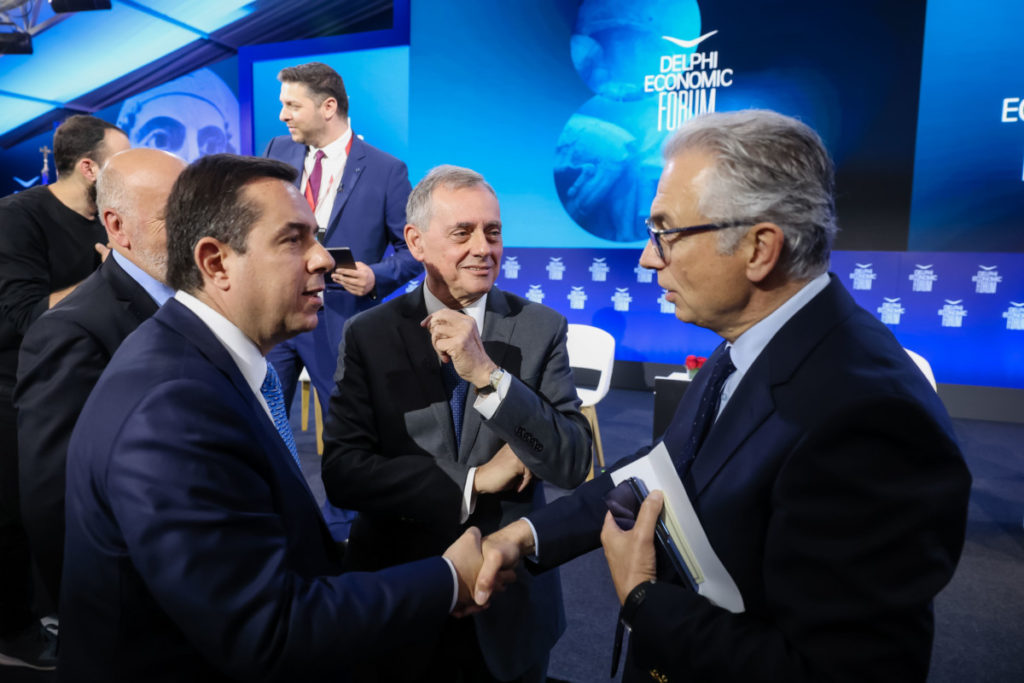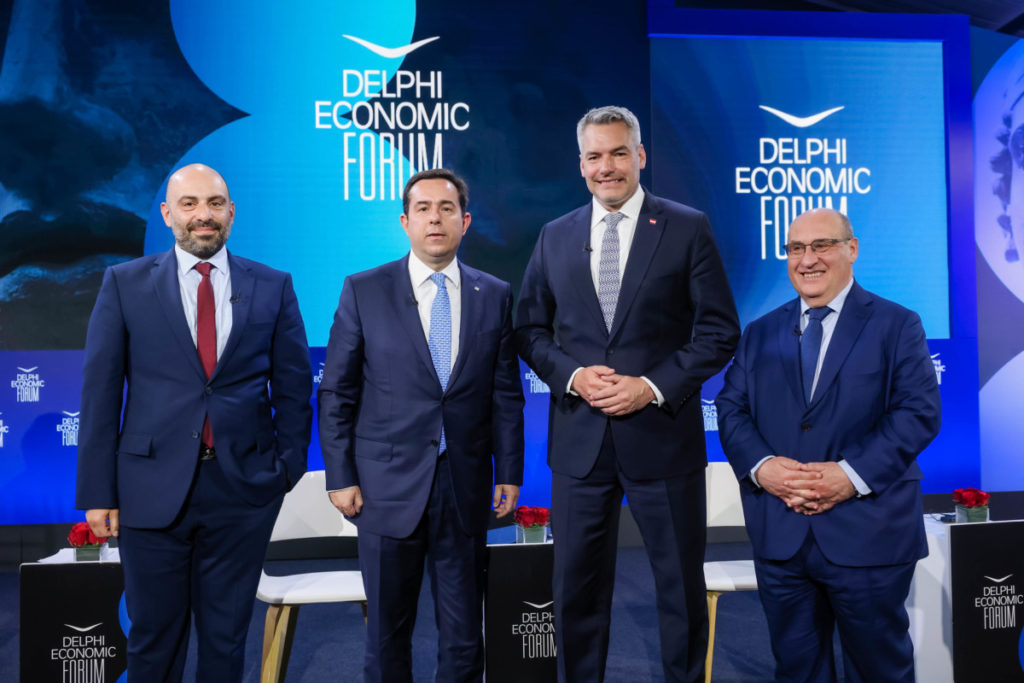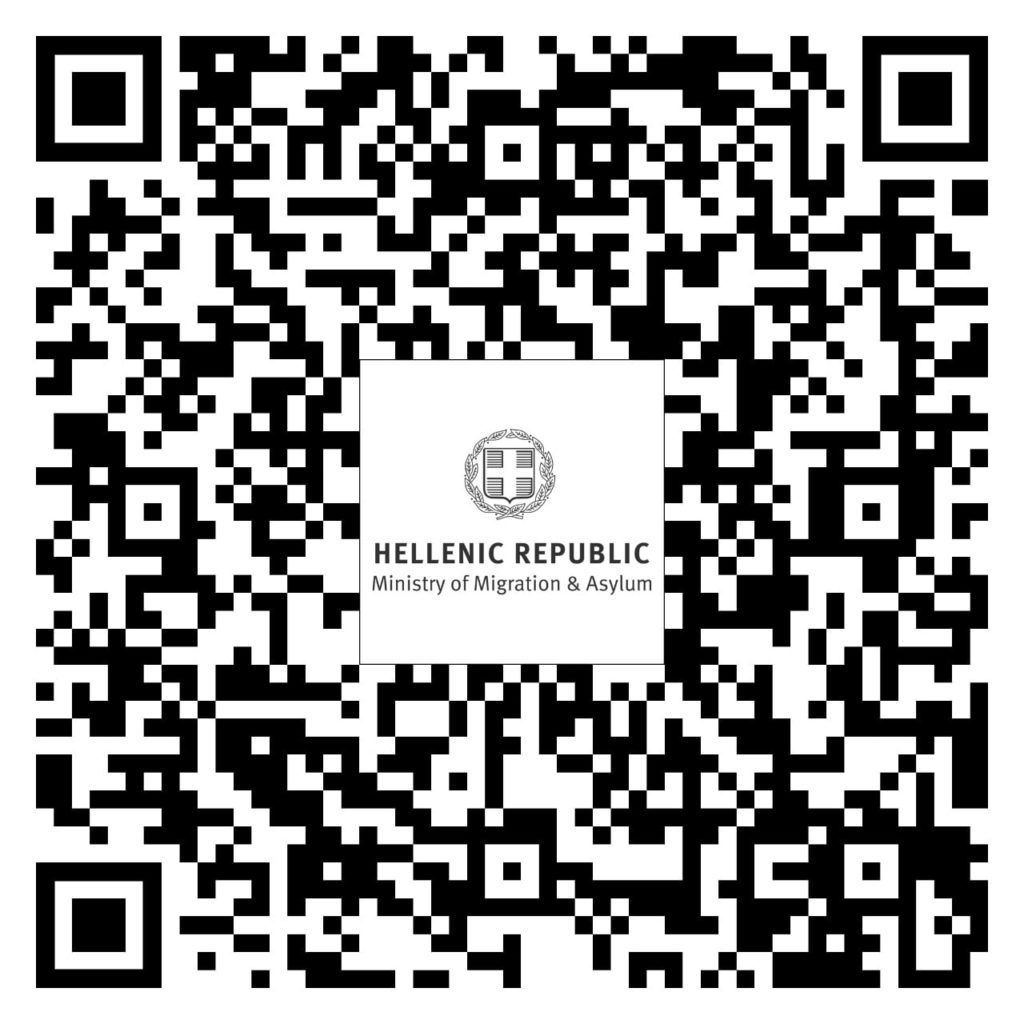The Minister of Μigration and Asylum, Mr. Notis Mitarachi, spoke about the management of the migration crisis in previous years during his presentation at the Delphi Economic Forum.
Mr. Mitarachi participated in the discussion on “Building a safe, fair and responsible Migration Policy for European Societies” with the Federal Chancellor of Austria, Mr. Karl Nehammer, the Secretary General of the International Organization for Migration, Mr. Antonio Vitorino and head of Unit “Horizontal Policies” and Head of Athens Office, Directorate General for Structural Reform Support (DG REFORM), European Commission, Greece, Mr. Ioannis Hadjyiannis.

The complete statements by Notis Mitarachi:
First of all, it is true that during the period 2015-1019 Greece was overwhelmed by a high level of arrivals we had overcrowded camps not offering proper conditions to people seeking international protection. We focused in 2019 in 2 goals. First of all, to reduce the overall level of arrivals in the EU through Greece and second to mitigate the impact of migration on local communities, creating smaller, efficient camps with the help of the EU and the funding from DG HOME.
First of all I would like to say thank you as I am approaching the end of my term in the Ministry of Migration both to the Federal Chancellor at the Republic of Austria for the enormous tangible support they provided to our borders in Evros in March 2020 and especially to the IOM under the leadership of Antonio Vitorino that Greece clearly supports for his re-election, for the whole support that IOM has given us in Greece.
If we think about the migration crisis let’s be clear. Migration will be a phenomenon that will never stop. And problems could never stop. It is a healthy thing to have people migrating around the world but with rules. Greece envisages Europe providing more humanitarian corridors for people in need and let me remind you that Greece after the fall of the government regime in Kabul, was among the first EU countries to offer immediate humanitarian visas for 1 thousand people to come to Greece from Afghanistan.
At same time Greece is at the forefront of signing bilateral agreement with countries like Bangladesh and Egypt to provide for legal pathways for people to come to Europe. And also, we support the proper implementation of the 2016 Joint Communique of the European Council and the Republic of Turkiye under which both the EU- I have been very vocal about it- and Turkiye have made specific concessions to mitigate migration crisis. But let us be clear we can’t allow smugglers to be the ones that decides who comes and lives in Europe. And that’s the big challenge. Europe needs to protect its external borders and we need to co-operate with countries in the region for them to do the same.
In the last few years, there have been a number of organisations trying to create new International Law. And I think we need to stick to the basics of the Geneva Convention. The Geneva Convention is the guiding force for international humanitarian law. Some people are trying to argue that there is an automatic right of access to European territory. That people have an automatic right to cross the borders and come to the EU. If that was true, there would be no passports and no visas around the world. People would just board any plane and would go from anywhere to anywhere. But this is not international law. And because Greece has the privilege of neighbouring only advanced democracies, neighbouring only countries that are members of the Council of Europe and NATO, that gives us the moral standing to protect with respect to the International Law, the international perimeter.
Two final points. I think Europe needs to decide on two things. And I think we are very far away from reaching a consensus. The first is how do we mitigate total arrivals to the EU, both primary and secondary flow, and I recognize the impact that Austria is facing. The second question we haven’t answered in Europe is what do we do with people that come to Europe and are eligible for protection. How do we share the pressure of these arrivals fairly, equitably throughout Europe. And I think that there is still a lot of work to be done around the Pact of Migration and Asylum to reach any answers on these two critical points.
—
I think it is clear that fences are not in theory ideal, but they are obviously much needed. And a lot of countries, in the region in the EU and outside the EU, are investing in fencing technology to prevent the smugglers from making money from people in misfortunes. There has been a lot of progress in the recent European Council, and I think the conclusions to the European Council is a step forward and the Chancellor previously in his fireside debate explained that now the EU is willing to support the construction of fencing indirectly through paying for necessary complimentary infrastructure and technology. And I can tell you that Greece has secured 100 million euros from the EU as part of the multiannual framework for such investments in the Evros region.
We have started an initiative a year and a half ago. Austria, Lithuania, Poland and Greece, we created what we call the Vilnius process. We met in Vilnius in January 2022, and we met in Athens in February 2023, all the EU member states the Commission and the European Agencies, and we were pleased that both in Vilnius and in Athens the majority of member states signed a Declaration including the need of fencing as part of a comprehensive European approach to reduce smuggling.
So, what is the strategy? Fencing in the borders, prevent illegal arrivals, humanitarian corridors and for people to come and work in Europe, legal pathways. So, we are not saying that Europe should be closed to people coming in. The contrary. But it should be Europe who selects who comes, with our rules, our processes. And that also ensures that we have the ability to invest in these people integrating in our societies in a good way. And we can’t tolerate anymore all these smuggling networks operating primarily in the North of Africa creating all the flows coming to Europe now predominantly through Italy which –you know- few months ago declared itself in a state of emergency. We need to find a solution for these networks to stop.
—
People coming irregularly to the European Union many times are exploded themselves, because they work in the grey labour market, and they are not protected in a way they should in the European society. It is not beneficial for the countries of origin or the countries of arrival. So, orderly migration must become a European Union priority. I will agree with you however, that providing legal pathways does not automatically mean that irregular migration mean smuggling. But the bilateral agreements that Greece has entered, and I think that they would be a useful tool for the European Union member states, normally would provide for two clauses.
Clause number 1: Legal Pathways
Clause number 2: Cooperation on returns for those who came irregularly
So, a lot of countries of origin – and I think that we should be very clear here – as it is a political challenge for the European Union the irregular arrivals, it is a political challenge for countries of origin to return of people. It is a critical issue in the domestic political agenda. A lot of these governments they are trying to find also a fair deal for their own citizens and the balance of legal pathways and cooperating in dismantling networks in return, it’s a fair balance that Europe can offer.
—
There is a lot of work that still needs to be done on the Pact. It’s still doesn’t address the fundamental questions; how do we reduce the overall flows coming to the European Union. Obviously, Europe must work together. It is a common challenge. It is a common problem. I was very proud to be a member of the Council of the EU in the meeting that we accepted to open the Directive for Ukrainian displaced people to come to Europe. Αnd that demonstrates that it was an enormous step forward to a common European asylum policy. We open the borders for people to come from Ukraine and more importantly we abolished Dublin does not apply for people coming from Ukraine, which is also an important step forward. So, I think that the solution when we go back to the Pact, fundamentally we need to reduce flows. Αnd there is a lot of initiative from the European Commission, but still the arrival rate in 2020 to 2023 demonstrates that we are not achieving the goal we have, and we need to see again what the post Dublin Europe will be.
One last word politically, as we are approaching the general elections in Greece on 21st of May. Migration is a very polarised and sensitive topic in most European Countries. And if moderate politicians cannot find a solution that works, we are giving room to more radical people to try populists to gain European vote. So, it is important for the mainstream politicians – that’s big priority also for the EPP – to work to find a solution that works.
—
Just found one oxymoron very interesting, just as a closing remark. I many times got letters from European colleagues complaining about secondary flows and the same letter complaining about the border protection. With that demonstrate that Europe still hasn’t decided what kind of migration policy we need to have.



